"I can tell you the license plate numbers of all six cars outside. I can tell you that our waitress is left-handed and the guy sitting up at the counter weighs two hundred fifteen pounds and knows how to handle himself. I know the best place to look for a gun is the cab of the gray truck outside and, at this altitude, I can run flat out for a half mile before my hands start shaking. Now why would I know that? How can I know that and not know who I am?" — Jason Damon (or was it Matt Bourne?)
While it seems only fitting to begin with that most memorable of amnesiacs, I can't help but feel identity crises are a uniquely human conceit. If Jason Bourne was a pig, for example, the movie would be very short or quite mundane, but – in either case – end with the protagonist still a pig slurping fish stew aboard a French trawler. Unlike humans, what animals are is so closely tied to their personality that amnesia would pose, at most, a momentary hurdle. It is only where individuality is concerned that memory loss becomes a genuine dilemma...
In the gaming world, of course, the most renowned amnesiac has just got to be Planescape: Torment's Nameless One – a character who was unique in gaming history, because he was, at the same time, someone (an individual known by others with a pre-existing past); and a blank slate (because which aspects of his past selves he chose to adopt were left entirely up to the player).
That introspection coupled with enormous player agency and the fact that a significant part of its plot unfolded through dialogue (instead of the commonplace "kill enemies for XP" RPG trope) was what made Torment such a memorable game.
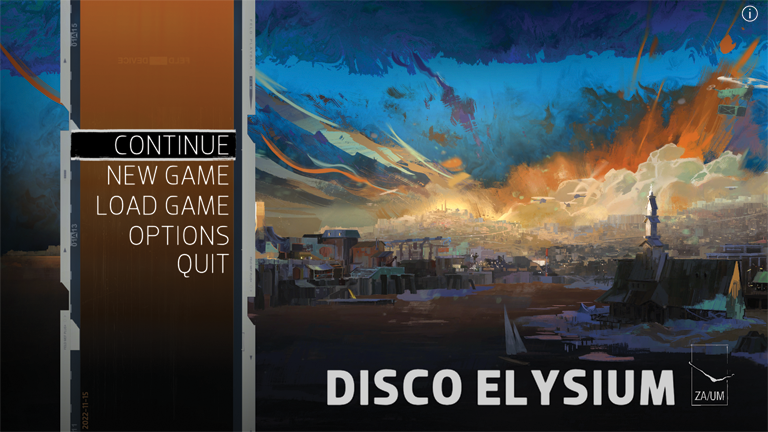
And while Disco Elysium shies away from the recurrent combat of its spiritual ancestor, it very much retains (and, to a great extent, expands) the concept of looking inward and spending as much time debating with oneself as interacting with the outside world.
In Disco, you play a scruffy man who wakes up hungover in a trashed apartment without any idea of who he is, how he got there and what he is supposed to be doing. And while, in fairly short order, you discover that you are, in fact, a police officer investigating a brutal murder, getting to the bottom of the case is a side road, at most, on an amazing journey of self-discovery, many an interior debate, endless second-guessing and exploration of the awe-inspiring seaside town of Martinaise.
Based on a pen and paper world lead writer Robert Kurvitz conceived of during a drunken evening's musings with his then-band Ultramelanhool, at its heart Disco Elysium is very much an RPG's RPG and, as such, rooted in stats. These come in two distinct flavors.
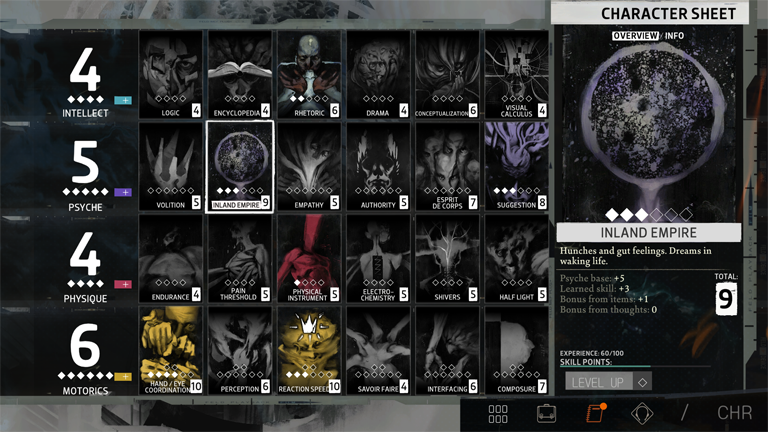
While the four attributes – that of Intellect, Psyche, Physique and Motorics – determine the base capabilities of your character's physical self, the 24 characteristics subordinate to them describe the entirety of his acquired abilities, making for a fairly thorough picture of an individual human being.
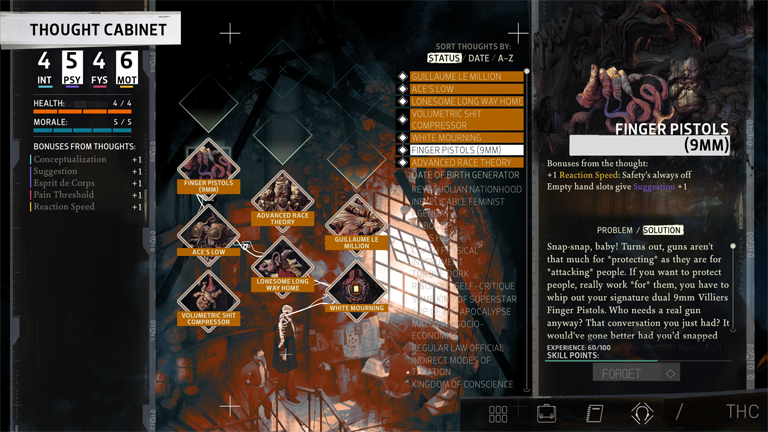
On top of attributes and characteristics, your engagement with the game world can also lead to the formation of thoughts, which the game stores in a handy Thought Cabinet. There, you can examine the budding notions for usefullness at length and leisure, which (when completed) lead to ability bonuses which further shape the character in your image.
The thoughts are an especially inventive and engaging mechanic for an amnesiac character, because they constantly challenge your perception of yourself. Run into a devout communist, for example, and your character will wonder whether collective ownership is something he ought to be concerned with (which you are, of course, free to encourage or dismiss, as you see fit). It is an inspired way to constantly offer you ways to re-invent your character and makes for some, at times hilarious, reading.
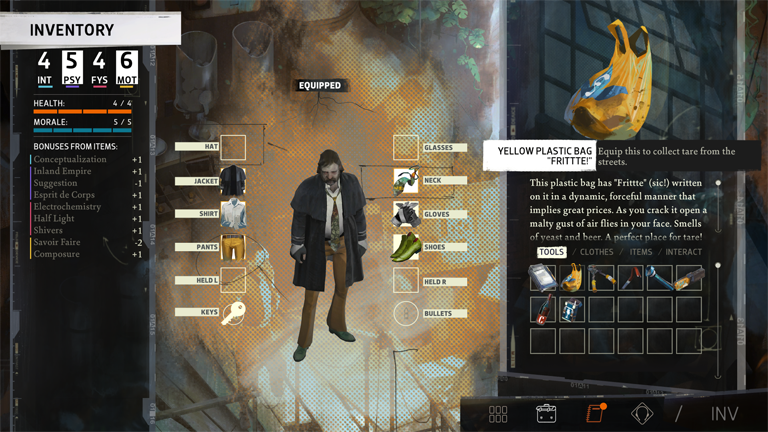
Lastly, the inventory screen carries all your worldly goods which alternate between plot items and clothes (which also offer bonuses to characteristics). Here you can see all of the detritus you accumulate during your exploration of Martinaise and its environs.
Speaking of Martinaise, it is glorious. Not pretty, mind, seeing as how it is a desolate resort town still reeling from wartime destruction. But rich – full of interesting characters and intriguing locations, like a lived-in museum of an alternate past. Here you will find abandoned shopping arcades next to stark wartime bunkers, docks straining to leverage some vestige of economy next to desolate streets riddled with recent bullet holes, stacked and cramped apartment blocks overlooking vast expanses of undeveloped land; and all of it in a partly-familiar (well, if you happened to grow up east of the Iron Curtain when it was still a thing, anyway), partly alien (think 1920s meets steampunk with a dash of Planes' oddness thrown in) setting that is 100% engrossing.
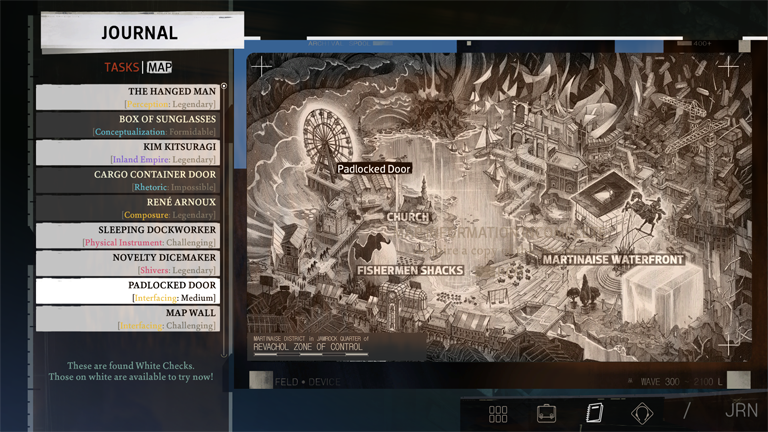
In an era where "world-building" is frequently code for "how tight a female protagonist's outfit oughta be", Disco Elysium represents years of heartfelt development on a scale not even AAA studios (with their pet renowned writers) can compete with. The settings, situations and ideas you'll find in this game are unlike anything you are likely to bump into in the lobotomized-for-public-consumption comic strip that passes for modern game writing.
Accompanying you on your exploration, is your mild-mannered partner – Kim Kitsuragi – who is soft-spoken, intelligent, infinitely patient (as you'd have to be, I suppose, to put up with such a mess as the PC has potential to be), who is one of my favorite NPCs ever.
Far from being some buddy-cop sounding board construct you bounce your brilliant deductions off of, Kim feels like a real person – a real person who has strong opinions, motivations and outlooks, which he will reluctantly (politely) share if it means keeping you from going off the rails.
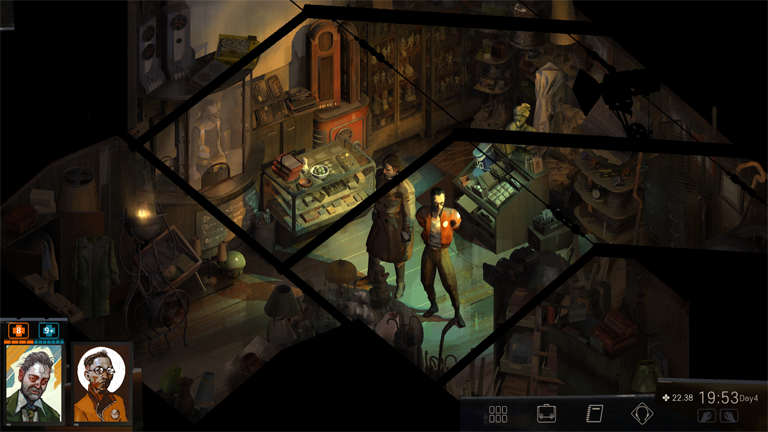
Kim is a great NPC not because he goes along with everything you say – quite the opposite, in fact! He will readily call you out if you are about to do something stupid, will openly share his own, divergent opinions and will try to steer you away from the more egregious decisions you may (and indeed can) make. But, in spite of his wariness and criticism, Kim is very much your loyal partner, who may well second-guess you, but will always have your back.
Though the game does have a main plot, the route to it is so meandering and so full of lovingly concocted sidelines and distractions, that the ten days you get to enjoy 'em may not seem like enough time. But while, at the outset, you may feel hurried or pressed, once you get a handle on the fact that a day takes actual hours to wrap up, you should be able to relax a little (which is the best mindset to enjoy this game in). There's so much to do in Disco that rushing through it does the content a grave injustice.
And while the writing and structure of the plot will put some pressure on you, do yourself a favor and don't give in. The most time is lost when you travel between zones. Within a zone, you can spend a considerable amount of time without losing a significant portion of the day. So long as you exhaust your options for a given zone before traveling, you'll be in good shape to get the most out of all of Martinaise's nooks and crannies.
If you enjoy deep world-building on a scale seldom seen in today's gaming scene; quirky settings, abandoned places, good police procedurals; gameplay that has more to do with discovery and decisions than run-run, shoot-loot; characters that have soul, music that sets the mood and a story that will happily let you barrel down whatever rabbit hole strikes your fancy at a given moment, please, please, please do yourself a favor and play Disco Elysium. It is the rare instance of a mere product and genuine art rubbing shoulders, which you are unlikely to encounter again for many years to come...
Pig recommends:
-
-not supporting future ZA/UM releases; through legal shenanigans, the studio's founders were ousted from their own company some three years after Disco's release and what's left no longer represents the talent responsible for this gem of a game; if you want to support someone worthwhile, keep an eye out for Robert Kurvitz and Aleksander Rostov; hopefully, somehow, we have not heard the last of them on the gaming scene; as for ZA/UM? it's probably best to enjoy their one, brilliant release and simply forget the rest;
-
-Three Days of a Tiger (book) by Mirosław Piotr Jabłoński, for an equally trippy story about a government agent with identity lapses in a microcosm of a world beset by forces bent on re-writing reality; it's not a great read, but it is competently assembled and moves along briskly, involving some really offbeat world-building ideas; if you like your stories stock with unexpected turns, this one is unlikely to disappoint you;
-
and (of course)
-
-Planescape: Torment;
